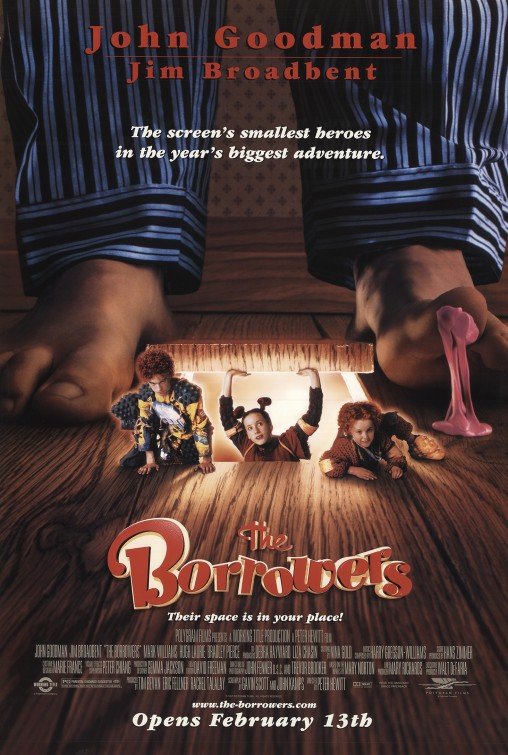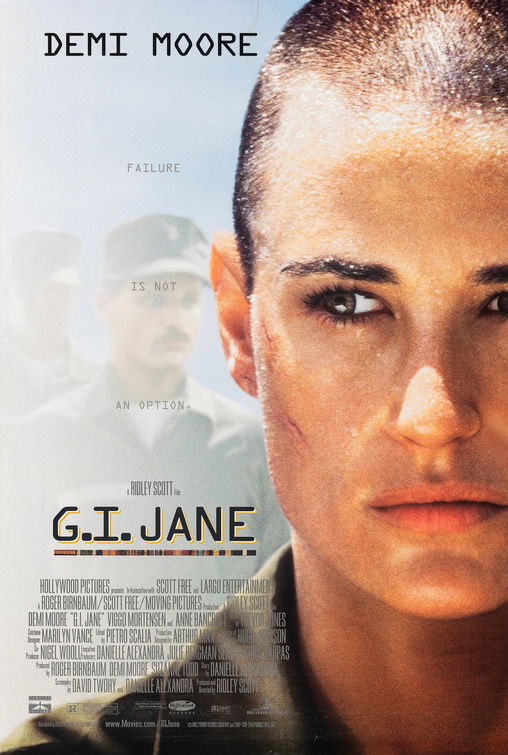“Female Killing Machine”

| None | Light | Moderate | Heavy | |
|---|---|---|---|---|
| Language | ||||
| Violence | ||||
| Sex | ||||
| Nudity |
What You Need To Know:
Dramatically appealing, but containing intense obscene language and graphic violence, G. I. JANE promotes an overtly feminist agenda. G.I. JANE unfolds on two levels. The first is a conventional story of a patriotic individual overcoming great obstacles in a military boot camp. On this level, G. I. JANE succeeds. The second unfolds as politically correct feminist polemic. In G. I. JANE, Lt. O’Neill engages in a contest to prove that a woman can equal or beat a man in the most warlike unit in the U.S. Navy. The result is a copy of male prowess, rather than a female addition to it.
Content:
(Pa, PC, Fe, LL, VV, N, A) Pagan, feminist, politically correct world view of female military trainee in boot camp; 24 obscenities & 7 profanities; extensive military boot camp violence including: man beating men & woman, woman beating & kicking man, men firing bullets over men’s heads, training camp barrels rolling over men’s heads; upper male nudity & rear lower female nudity; and, alcohol
More Detail:
G. I. JANE begins as U.S. Senator Lillian DeHaven (Anne Bancroft) sifts through photographs of women candidates for the first female SEAL trainee. In order to win points with her southern female constituents, Senator DeHaven expresses indignation at a public hearing over the military’s anti-female bias in combat training and demands that a woman be admitted to SEAL training. Finding a suitably pretty-faced recruit who could if necessary grace the cover of Newsweek magazine, she recommends Lieutenant O’Neill (Demi Moore) for SEAL training and informs her that her success or failure could change the Defense Department’s attitude toward women in the military. She does not tell O’Neill that she expects her to fail.
Her decision to pursue SEAL training having caused romantic tension with her naval comrade-boyfriend, Royce (Jason Beghe), who objects to her living with potentially sexually aggressive commandos for three months. Lt. O’Neill leaves him behind and embarks on a grueling Navy SEAL boot camp training. Predictably, she encounters a particularly antagonistic Drill Chief John Urgayle (Viggo Mortensen), who inflicts pain and suffering on the recruits in his attempt to weed out the weak-willed. Lt. O’Neill successively does pushups on the beach, helps other trainees roll huge oil barrels up a sandy hill and swims across muddy enemy territory with bullets flying overhead in an exercise meant to instill mutual trust and cooperation. Can she succeed in a boot camp where 60% of the men fail?
Lt. O’Neill brings an iron-hard feminist determination to obliterate any sexual distinctions between her and the men on her team, insisting to the boot camp commandant, Commanding Officer Salem (Scott Wilson), that points added because she is a woman be deducted from her score in the mud crawl exercise. Under duress, he agrees to eliminate any gender bias in her favor in training evaluations. Officer Salem asks her if she would let him show her the civility to open the door for her when she came into his office. Her response: “I can’t afford civility, sir.”
So, reinforced with the victory over her commanding officer, she proceeds to lower herself to the level of the male recruits in her barracks, including shaving her head, moving her bed next to theirs and fighting the Master Chief in personal combat to demonstrate that a woman can hold her own in guerrilla warfare. After fighting the Master Chief, and he still derides her fighting ability, she makes a retort with a familiar epithet referring to the male anatomy. However, she is a woman and doesn’t have the male appendage. Of course, that bit of anatomical fantasy endears her to the other recruits, who cheer for her and then invite her to the bar to drink beers with them.
With striking allusions to 1982’s masterpiece, AN OFFICER AND A GENTLEMAN, which starred Richard Gere and Louis Gossett, Jr. (who evolves into a sympathetic hero figure unlike G.I. JANE’s Viggo Mortensen), G.I. JANE unfolds on two levels. The first is the level of pure spectacle with an arresting cast in a conventional story of an individual with patriotic intentions overcoming great artificial obstacles in a military boot camp setting. On this level, G. I. JANE succeeds, because of the dramatic appeal of Lt. O’Neill as she contends with the historic anti-female bias in combat training. For example, when she enters the relatively hostile environment of the base lunchroom, and two cadets get up, rather than sit with her, but she remains despite the slight. In all, she absolutely convinces viewers that she is determined to graduate from SEAL training. It is not a gracious process to behold.
The second level unfolds as politically correct feminist polemic. In G. I. JANE, Lt. O’Neill engages in a contest to prove that a woman can equal or beat a man in arguably the most virile, warlike military unit in the U.S. Navy. (Which reminds the reader that Hollywood must now make three other movies demonstrating that women can equal or beat men in the other three services: The Army, the Air Force and the Marines.) On this level, G. I. JANE achieves perhaps one of the ultimate feminist objectives: to utterly obliterate any gender distinctions between men and women respecting their capacity for or ability to engage in guerrilla warfare. In short, in G. I. JANE, Demi Moore actively collaborates in the Navy’s transformation of her from ordinary U.S. Naval service woman to the ultimate female killing machine.
What is the point? Moral viewers will question the philosophical intent of this movie, which seeks to legitimize women as Navy SEAL officers, one of the most aggressive units in the entire U.S. armed services. This type of retro-feminism seeks to find out how a woman can equal or beat a man at performing manly tasks in a male sphere of influence. The result is, at best, a copy of male prowess, rather than a female addition to it. Admitting that men’s and women’s spheres of influence differ and that men’s and women’s talents lie in differing spheres, godly, enlightened feminism might seek to find out how a woman can complement not replace a man. God created men and women differently and intended the differences to complement, rather than to compete with each other.
Splendidly directed, but with questionable philosophical intent, G. I. JANE provides diverting and intense entertainment, yet promotes an overtly feminist agenda. Beware of an intense emotional experience, with coarse language and graphic violence.


 - Content:
- Content: 
